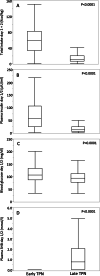Effect of withholding early parenteral nutrition in PICU on ketogenesis as potential mediator of its outcome benefit
- PMID: 32867803
- PMCID: PMC7456767
- DOI: 10.1186/s13054-020-03256-z
Effect of withholding early parenteral nutrition in PICU on ketogenesis as potential mediator of its outcome benefit
Abstract
Background: In critically ill children, omitting early use of parenteral nutrition (late-PN versus early-PN) reduced infections, accelerated weaning from mechanical ventilation, and shortened PICU stay. We hypothesized that fasting-induced ketogenesis mediates these benefits.
Methods: In a secondary analysis of the PEPaNIC RCT (N = 1440), the impact of late-PN versus early-PN on plasma 3-hydroxybutyrate (3HB), and on blood glucose, plasma insulin, and glucagon as key ketogenesis regulators, was determined for 96 matched patients staying ≥ 5 days in PICU, and the day of maximal 3HB-effect, if any, was identified. Subsequently, in the total study population, plasma 3HB and late-PN-affected ketogenesis regulators were measured on that average day of maximal 3HB effect. Multivariable Cox proportional hazard and logistic regression analyses were performed adjusting for randomization and baseline risk factors. Whether any potential mediator role for 3HB was direct or indirect was assessed by further adjusting for ketogenesis regulators.
Results: In the matched cohort (n = 96), late-PN versus early-PN increased plasma 3HB throughout PICU days 1-5 (P < 0.0001), maximally on PICU day 2. Also, blood glucose (P < 0.001) and plasma insulin (P < 0.0001), but not glucagon, were affected. In the total cohort (n = 1142 with available plasma), late-PN increased plasma 3HB on PICU day 2 (day 1 for shorter stayers) from (median [IQR]) 0.04 [0.04-0.04] mmol/L to 0.75 [0.04-2.03] mmol/L (P < 0.0001). The 3HB effect of late-PN statistically explained its impact on weaning from mechanical ventilation (P = 0.0002) and on time to live PICU discharge (P = 0.004). Further adjustment for regulators of ketogenesis did not alter these findings.
Conclusion: Withholding early-PN in critically ill children significantly increased plasma 3HB, a direct effect that statistically mediated an important part of its outcome benefit.
Keywords: Intensive care; Ketogenesis; Ketone body; Parenteral nutrition; Recovery.
Conflict of interest statement
We declare no competing interests.
Figures



Similar articles
-
Outcomes of Delaying Parenteral Nutrition for 1 Week vs Initiation Within 24 Hours Among Undernourished Children in Pediatric Intensive Care: A Subanalysis of the PEPaNIC Randomized Clinical Trial.JAMA Netw Open. 2018 Sep 7;1(5):e182668. doi: 10.1001/jamanetworkopen.2018.2668. JAMA Netw Open. 2018. PMID: 30646158 Free PMC article. Clinical Trial.
-
Non-Thyroidal Illness Syndrome in Critically Ill Children: Prognostic Value and Impact of Nutritional Management.Thyroid. 2019 Apr;29(4):480-492. doi: 10.1089/thy.2018.0420. Epub 2019 Mar 11. Thyroid. 2019. PMID: 30760183 Free PMC article. Clinical Trial.
-
Impact of withholding early parenteral nutrition completing enteral nutrition in pediatric critically ill patients (PEPaNIC trial): study protocol for a randomized controlled trial.Trials. 2015 May 1;16:202. doi: 10.1186/s13063-015-0728-8. Trials. 2015. PMID: 25927936 Free PMC article. Clinical Trial.
-
PN Administration in Critically Ill Children in Different Phases of the Stress Response.Nutrients. 2022 Apr 27;14(9):1819. doi: 10.3390/nu14091819. Nutrients. 2022. PMID: 35565787 Free PMC article. Review.
-
Early Supplemental Parenteral Nutrition in Critically Ill Children: An Update.J Clin Med. 2019 Jun 11;8(6):830. doi: 10.3390/jcm8060830. J Clin Med. 2019. PMID: 31212639 Free PMC article. Review.
Cited by
-
Personalized nutrition therapy in critical care: 10 expert recommendations.Crit Care. 2023 Jul 4;27(1):261. doi: 10.1186/s13054-023-04539-x. Crit Care. 2023. PMID: 37403125 Free PMC article. Review.
-
Clinical and metabolic phenotyping of continuous versus intermittent ENteral NUTrition in ventilated adults with shock: ENNUT trial protocol.BMJ Open. 2025 Aug 1;15(7):e099761. doi: 10.1136/bmjopen-2025-099761. BMJ Open. 2025. PMID: 40750277 Free PMC article.
-
Persistent inflammation, immunosuppression, and catabolism syndrome (PICS): a review of definitions, potential therapies, and research priorities.Br J Anaesth. 2024 Mar;132(3):507-518. doi: 10.1016/j.bja.2023.11.052. Epub 2024 Jan 4. Br J Anaesth. 2024. PMID: 38177003 Free PMC article. Review.
-
How to avoid harm with feeding critically ill patients: a synthesis of viewpoints of a basic scientist, dietitian and intensivist.Crit Care. 2023 Jul 1;27(1):258. doi: 10.1186/s13054-023-04543-1. Crit Care. 2023. PMID: 37393289 Free PMC article. Review.
-
Early phosphate changes as potential indicator of unreadiness for artificial feeding: a secondary analysis of the EPaNIC RCT.Crit Care. 2025 Jan 28;29(1):48. doi: 10.1186/s13054-025-05273-2. Crit Care. 2025. PMID: 39875953 Free PMC article. Clinical Trial.
References
-
- Alberda C, Gramlich L, Jones N, Jeejeebhoy K, Day AG, Dhaliwal R, et al. The relationship between nutritional intake and clinical outcomes in critically ill patients: results of an international multicenter observational study. Intensive Care Med. 2009;35(10):1728–1737. doi: 10.1007/s00134-009-1567-4. - DOI - PubMed
-
- Doig GS, Simpson F, Sweetman EA, Finfer SR, Cooper DJ, Heighes PT, et al. Early parenteral nutrition in critically ill patients with short-term relative contraindications to early enteral nutrition: a randomized controlled trial. JAMA. 2013;309(20):2130–2138. doi: 10.1001/jama.2013.5124. - DOI - PubMed
Publication types
MeSH terms
Substances
Grants and funding
- AdvG-2017-785809/Horizon 2020 Programme/International
- METH14/06/Methusalem programme of the Flemish Government/International
- METH14/06/Methusalem programme of the Flemish Government/International
- IWT/070695/TBM/Agentschap voor Innovatie door Wetenschap en Technologie (BE)/International
- G.0C78.17N/Research Foundation Flanders/International
LinkOut - more resources
Full Text Sources

